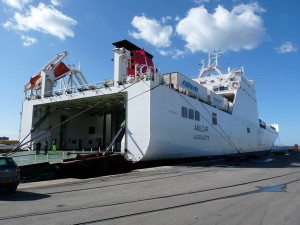 Fifteen years after the Barcelona Process, the expected payoffs between Europe and the South Mediterranean countries have not materialized. What is the challenge posed to the European Union by the South Mediterranean countries? It is to resolve the lack of convergence of these regions. According to Ahmed Galal, president of FEMISE, Europe must find a new mode of cooperation and support. The free trade agreements must be far-reaching and more careful attention must be given to the free movement of workers.
Fifteen years after the Barcelona Process, the expected payoffs between Europe and the South Mediterranean countries have not materialized. What is the challenge posed to the European Union by the South Mediterranean countries? It is to resolve the lack of convergence of these regions. According to Ahmed Galal, president of FEMISE, Europe must find a new mode of cooperation and support. The free trade agreements must be far-reaching and more careful attention must be given to the free movement of workers.
The methods of cooperation between Europe and the South Mediterranean countries are not always satisfactory. The Neighbourhood Policy, the Barcelona Process, the Euro-Med agreement… Both shores of the Mediterranean have not derived sufficient benefits from these in Ahmed Galal’s view.
According to the president of FEMISE, also managing director of the Economic Research Forum in Cairo, the increase in trade these last few years has not enabled to reduce the divide with the South Mediterranean countries, the living standards of which still remain below the European level and without convergence.
The observation is identical from the point of view of trade between the Mediterranean countries.
The introduction of the GAFTA (Greater Arab Free Trade Area) between the countries of the South Mediterranean has not brought about the effects reckoned on at the level of the GDP as well as trade, although the potential resulting from regional integration is certainly genuine. South-South integration must also be encouraged for example from unification of the rules of origin.
Encouraging Mobility of Workforce
“We must put in place a genuine trade agreement with the countries of the EU and encourage the temporary mobility of Mediterranean workers to Europe. The agreements to come must not be based uniquely on opening of the market to merchandise”, explains Ahmed Galal furthermore, mentioning the example of the United States/Canada agreement with Mexico.
If it is necessary to continue the efforts to increase the flow of goods, capital and services, the Egyptian economist advocates the mobility of the workforce, with the guarantee of a return to the country of origin, and a greater flow of qualified people, the proof being that development in the South Mediterranean will come with the knowledge-based economy and the efforts of the Mediterranean countries in the domains of research and training. To bridge the gap with Europe the emphasis must be put on innovation.
The objective is to create a partnership with positive effects on both shores of the Mediterranean as Europe remains the principal commercial partner of the Mediterranean, even though it is observing an erosion of trade in favour of the countries outside the EU, notably China. In this sense, Ahmed Galal recommends getting over the last obstacles concerning European goods imported in the Mediterranean by removing the price barriers.
For its part, Europe should open its market to Mediterranean agricultural products as it did in its time for Spain when it joined the Community in 1986. For Ahmed Galal, these disadvantages can only be resolved if the political will is genuine and does not remain simply restricted to lip service.
Photo by NBC, Econostrum.
Article by Nathalie Bureau du Colombier, Econostrum. It belongs to a series of articles published in the context of the partnership between Econostrum and Femise for the year 2010. These articles also feed the “Grand Angle” part of the Econostrum Website. You can find this topic and all information at the following address: www.econostrum.info. Registration for the Econostrum newsletter is available here:http://www.econostrum.info/subscription/


